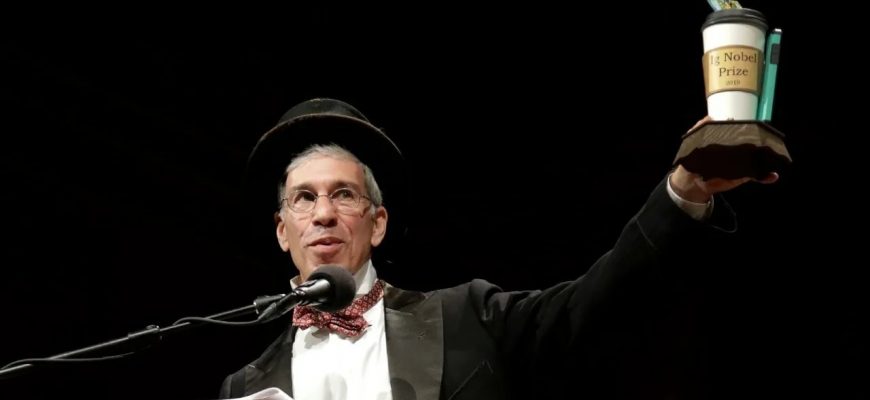Read the following text about the Ig Nobel Prizes, which are an American parody of the Nobel Prizes. For questions 1-5 below, decide which of the options is true.
The Ig Nobel Prizes
Organized by the scientific humor magazine Annals of Improbable Research (AIR), the lg Nobel Prizes are presented by a group that includes genuine Nobel Laureates at a ceremony at Harvard University’s Sanders Theater.
A parody of the Nobel Prizes, the Ig Nobel Prizes are given each year in early October — around the time the recipients of the genuine Nobel Prizes are announced — for ten achievements that “first make people laugh, and then make them think”. All prizes are awarded for real achievements (except for three in 1991 and one in 1994 due to an erroneous press release).
This is a list of some Ig Nobel Prize winners from 1993 to the present day:
1993. Literature – Presented to E. Topol, R. Califf, F. Van de Werf, P. W. Armstrong, and their 972 co-authors, for publishing a medical research paper which has one hundred times as many authors as pages. The authors are from the following countries: Australia, Belgium, Canada, France, Germany, Ireland, Israel, Luxembourg, the Netherlands, New Zealand, Poland, Spain, Switzerland, the United Kingdom, and the United States.
2000. Chemistry – Presented to D. Marazziti, A. Rossi, and Giovanni B. Cassano of the University of Pisa, Italy, and H. S. Akiskal of the University of California, San Diego, for their discovery that, biochemically, romantic love may be indistinguishable from having severe obsessive-compulsive disorder.
2004. Chemistry – Presented to The Coca-Cola Company of Great Britain, for using advanced technology to convert liquid from the River Thames into Dasani, a brand of bottled water, which for precautionary reasons has been made unavailable to consumers.
2006. Peace – H. Stapleton of Merthyr Tydfil, Wales, for inventing an electromechanical teenager repellent, a device that makes annoying high-pitched noise designed to be audible to teenagers but not to adults; and for later using that same technology to make telephone ringtones that are audible to teenagers but probably not to their teachers.
2009. Literature – Ireland’s police service for writing and presenting more than 50 traffic tickets to a Polish individual, by the name of “Prawo Jazdy”. Mr. “Jazdy” was widely thought to be the most frequent driving offender in Ireland, until an investigation uncovered the fact that Prawo Jazdy is the Polish term for “Driving License”.
Exercise:








